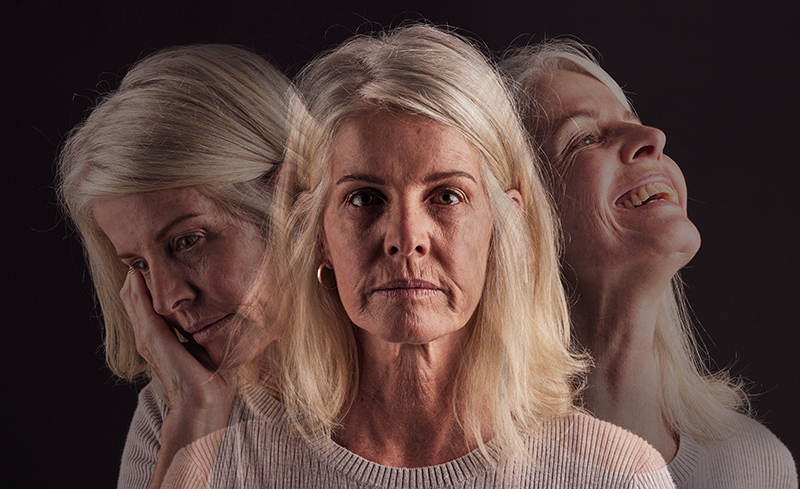Bio-degradable cards
Every card imaginable!
|
Bio-degradable cards Every card imaginable! Understanding Bipolar Disorder Managing Symptoms and Embracing Support with Medical ID Cards
Understanding Bipolar Disorder: Basics and SymptomsWhat is bipolar disorder?Bipolar disorder is a mental health condition that causes significant changes in mood, energy, and behaviour. People with the condition experience extreme highs (mania or hypomania) and lows (depression). These changes can affect sleep, concentration, decision-making, and daily activities. The frequency of episodes varies. Some people may have only a few in a lifetime, while others can experience several within a year. Between episodes, some people feel stable, while others notice mild mood changes. What are the symptoms of bipolar disorder?Symptoms differ depending on whether someone is in a manic or depressive phase. Manic or hypomanic symptoms can include:
Depressive symptoms can include:
Some people may experience mixed episodes where symptoms of mania and depression happen at the same time, which can make it more difficult to recognise and manage. What does bipolar mean?The term “bipolar” literally refers to two “poles” or extremes of mood: the high pole (mania or hypomania) and the low pole (depression). It highlights that this is not just about feeling sad or happy occasionally; it involves episodes that are clearly outside a person’s normal mood. Bipolar disorder exists on a spectrum:
Understanding these distinctions can help individuals, families, and professionals recognise patterns and seek appropriate support. Is bipolar genetic?Bipolar disorder often runs in families, suggesting a genetic component. Studies show that if a parent or sibling has bipolar disorder, the risk of developing it is higher than in the general population. Twin studies suggest heritability may be as high as 70–80%, though no single gene causes the condition. Genes interact with environmental factors, meaning someone may inherit a vulnerability but not develop the disorder unless certain triggers or stressors occur. Research is ongoing to understand which genes and combinations increase risk and how they interact with lifestyle or environmental influences. Can lifestyle or environment affect bipolar disorder?Yes. While genetics influence susceptibility, lifestyle and environment play a major role in how bipolar disorder develops and progresses. Triggers can include:
Managing these factors can help reduce the frequency and severity of mood episodes. Strategies include maintaining a consistent daily routine, regular sleep, avoiding drugs and excessive alcohol, managing stress, and monitoring early signs of mood changes. 
Exploring Mania and Diagnosis in Bipolar DisorderWhat is mania?Mania is a state of unusually elevated or irritable mood that affects both thinking and behaviour. Unlike typical excitement or happiness, mania can feel overwhelming and interfere with daily life. People experiencing mania may feel extremely energetic, confident, or euphoric, often taking on multiple projects at once or making impulsive decisions they wouldn’t normally consider. Sleep needs can decrease significantly, sometimes to only a few hours a night, without the person feeling tired. Mania can also cause racing thoughts, fast speech, and difficulty concentrating, which can make communication challenging. While some may experience a sense of heightened creativity or productivity, mania can also put individuals at risk of financial, social, or legal problems if decisions are made impulsively. Hypomania is a milder form of mania. It shares similar traits—elevated mood, increased energy, reduced sleep—but it is less disruptive. People with hypomania may still function well in work or social settings, which sometimes makes it harder to recognise. What is a manic episode?A manic episode is a sustained period, usually lasting at least seven days (or less if hospitalisation is required), where symptoms of mania dominate a person’s behaviour and mood. During an episode, the individual’s energy levels, activity, and mood are consistently above their usual baseline. The severity can vary: some episodes are manageable, while others can involve psychotic symptoms such as delusions or hallucinations, requiring urgent medical attention. Common consequences include strained relationships, poor work performance, risky spending, or reckless behaviours. Manic episodes can occur in bipolar I disorder and sometimes in bipolar II disorder as hypomanic episodes. How is bipolar disorder diagnosed in the UK?Diagnosis typically starts with a visit to a GP, who may refer the person to a psychiatrist for specialist assessment. Clinicians usually:
A correct diagnosis can take months because mania can be mistaken for normal energy, stress, or other conditions such as ADHD, personality disorders, or depression. Accurate reporting of episodes, including the impact on daily life, is essential for proper diagnosis. How can you support someone with bipolar disorder?Supporting someone requires understanding the disorder and recognising that mood episodes are part of the condition, not a choice. Practical strategies include:
What are early warning signs of mood episodes?Early warning signs often appear days or weeks before a full manic or depressive episode. Recognising them allows the individual and their support network to take preventative action. Manic phase warning signs can include:
Depressive phase warning signs can include:
Tracking these signs in a mood diary or with mental health apps can help identify patterns, spot triggers, and allow interventions such as adjusting routines, contacting a healthcare provider, or increasing therapy sessions before symptoms escalate. Why is recognising mania and early symptoms important?Recognising early symptoms is essential for reducing the impact of episodes and maintaining stability. Early identification allows:
Understanding early signs empowers individuals to feel more in control of their condition rather than being caught off guard by sudden mood changes. Consistent monitoring and early intervention are key strategies for living well with bipolar disorder. 
The Progression of Bipolar Disorder Over TimeDoes bipolar disorder get worse with age?Bipolar disorder does not inevitably worsen as someone gets older, but the way it presents can change over a lifetime. Some people notice that manic episodes become less intense, while depressive episodes become longer or more frequent. Others may experience no major change in frequency or severity if they maintain consistent treatment and self-care routines. Long-term management has a significant effect on how the disorder progresses. Sleep disruption, high stress, physical health conditions, and substance use can all make episodes more frequent or severe. People who track their mood, recognise early warning signs, and maintain medication or therapy plans often experience more stability as they age. Life events, such as retirement, relationship changes, or chronic illness, can also influence mood patterns. Understanding these patterns allows individuals to anticipate triggers, plan support, and adjust their routines to reduce the impact of episodes. Can trauma trigger bipolar episodes?Trauma alone does not cause bipolar disorder, but it can act as a trigger for individuals who are genetically predisposed. Events such as the death of a loved one, abuse, serious accidents, or prolonged stress can precede the first manic or depressive episode. Trauma may also influence the severity and recurrence of future episodes. Stress-related triggers, disrupted sleep, or heightened emotional sensitivity can make symptoms harder to manage. Addressing trauma through therapy, such as cognitive behavioural therapy or trauma-focused counselling, can help stabilise mood, improve coping strategies, and reduce the risk of relapse. Being aware of personal triggers related to trauma enables people with bipolar disorder to plan for periods of increased support or intervention before episodes escalate. Can children have bipolar disorder?Yes, children can be diagnosed with bipolar disorder, though it is often more difficult to identify than in adults. Symptoms may appear as rapid mood swings, extreme irritability, explosive anger, or bursts of unusually high energy followed by periods of low mood. These behaviours can be mistaken for ADHD, oppositional defiant disorder, or typical childhood mood fluctuations. Early diagnosis is important because untreated bipolar disorder can affect school performance, friendships, family dynamics, and emotional development. Supportive treatment typically involves:
Early intervention helps children develop strategies to manage their moods, maintain social relationships, and navigate school effectively. Is bipolar disorder considered a disability?Bipolar disorder can be considered a disability when symptoms significantly affect daily life. In the UK, the Equality Act 2010 protects people whose condition substantially limits activities such as working, studying, or socialising. Recognition as a disability can allow access to workplace adjustments or support, including:
Not everyone with bipolar disorder will meet the threshold for disability. It depends on the severity and frequency of mood episodes and their impact on daily functioning. Being classified as disabled provides legal protections and helps individuals access practical support to maintain stability. How does bipolar disorder change over a lifetime?Bipolar disorder is a lifelong condition, but it is not static. Many people experience long periods of stability between episodes, particularly when treatment is consistent and lifestyle factors are well managed. Others may notice predictable patterns, such as episodes triggered by sleep disruption, stress, seasonal changes, or major life events. Over time, individuals often become more adept at recognising early warning signs, understanding personal triggers, and developing strategies to prevent or reduce the severity of episodes. Long-term management strategies include:
By combining awareness, structured routines, and ongoing treatment, people with bipolar disorder can maintain stable work, relationships, and overall quality of life, despite the condition being lifelong. 
Addressing Misconceptions and Questions About Bipolar DisorderIs bipolar a personality disorder?Bipolar disorder is not a personality disorder; it is a mood disorder. This distinction is important because mood disorders involve fluctuations in mood and energy, whereas personality disorders describe long-standing patterns of behaviour and thinking that are relatively consistent over time. People sometimes mistake mood swings for personality traits, assuming that someone is naturally moody, unpredictable, or difficult. In reality, bipolar disorder causes changes in mood that can be severe and disruptive, and these changes are separate from a person’s core character. Understanding this difference is critical for both treatment and social support. Treatment strategies also differ. Mood disorders often respond to medications such as mood stabilisers or antipsychotics, alongside therapy, while personality disorders usually require long-term psychotherapy approaches. For families, colleagues, and friends, recognising that symptoms are part of a medical condition, not a choice or personality flaw, is key to offering appropriate support. Is manic depression the same as bipolar disorder?Manic depression is the older term for what is now called bipolar disorder. Both terms describe the same condition: episodes of mania or hypomania and periods of depression. The term “bipolar disorder” is preferred because it more accurately reflects the two poles of mood swings that characterise the condition. Some people may still use “manic depression” colloquially, but the medical community uses “bipolar disorder” in diagnoses and treatment plans. The shift in terminology also helps clarify that the condition is ongoing and biological, rather than a temporary mood problem. Does bipolar go away?Bipolar disorder is a lifelong condition. It does not simply disappear, but symptoms can be managed effectively. With the right combination of treatment, lifestyle adjustments, and support, many people lead stable, fulfilling lives. Managing bipolar disorder typically involves:
While the condition itself remains, proper management helps reduce the frequency and severity of episodes, allowing individuals to maintain work, relationships, and daily functioning. Can bipolar disorder affect relationships and work?Bipolar disorder can impact both personal and professional life, particularly during manic or depressive episodes. During mania, people may make impulsive decisions, speak rapidly, or take on more than they can handle, which can strain friendships or workplace relationships. During depression, low energy, withdrawal, and difficulty concentrating can interfere with work performance and social interactions. Recognising early warning signs, maintaining treatment, and communicating openly with loved ones and colleagues can help manage these challenges. Support networks and workplace adjustments, such as flexible schedules or temporary workload changes, can make a significant difference in maintaining stability and relationships over time. Can lifestyle and environment influence bipolar disorder?Lifestyle and environment do not cause bipolar disorder, but they can influence symptom patterns and severity. Factors that can trigger episodes include:
Conversely, maintaining regular sleep, reducing stress, engaging in physical activity, and following a structured daily routine can help stabilise mood and reduce the likelihood of episodes. Being aware of environmental triggers empowers individuals to take proactive steps for long-term management. The Benefits of Carrying a Bipolar Medical ID CardWhy is a Bipolar Medical ID Card Important?A bipolar medical ID card provides crucial information to first responders, healthcare professionals, and anyone assisting in an emergency when the cardholder may be unable to communicate. It ensures that medical personnel are aware of the individual’s condition, which can influence treatment decisions, especially during severe manic or depressive episodes. Beyond emergencies, the card can also offer reassurance. Knowing that essential information is accessible quickly can reduce anxiety for both the cardholder and their loved ones. How Can a Bipolar Medical ID Card Be Beneficial?Medical ID cards offer practical advantages that go beyond simple identification: Emergency Situations: If someone experiences a sudden mood episode or medical crisis, responders can access the relevant information immediately. This helps ensure that care is appropriate and timely, potentially preventing complications or misunderstandings. Preventing Misunderstandings: Behaviours during manic or depressive episodes can sometimes be misinterpreted by the public or law enforcement. A medical ID card clearly communicates the individual’s condition, helping others respond appropriately and with understanding. Peace of Mind: Carrying a medical ID card can provide reassurance to both the person with bipolar disorder and their family. Knowing that crucial information is readily available reduces anxiety in daily life, travel, or public situations. Choosing a Bipolar Medical ID CardAt The Card Project UK, we offer a range of credit card-sized bipolar medical ID cards designed for ease of use. They are durable, waterproof, and made from biodegradable plastic, making them practical and environmentally conscious. Our cards are discreet yet clear, ensuring that sensitive health information is communicated effectively without drawing unnecessary attention. They can be customised to include the information most relevant to the cardholder, such as emergency contacts, medication details, or specific instructions for healthcare providers. Integrating a Medical ID Card into Daily LifeA bipolar medical ID card is a simple tool that supports safety, communication, and independence. It can be carried in a wallet, purse, or pocket, and becomes part of an overall management plan. When combined with therapy, medication, and lifestyle strategies, it helps people with bipolar disorder navigate emergencies, social situations, and everyday activities with greater confidence. By having a clear, accessible way to share critical health information, individuals and their support networks can feel more secure knowing that emergencies can be handled appropriately. To find out more visit our website today.
© 2024 The Card Project Uk Ltd
VAT: 453 2087 06
|